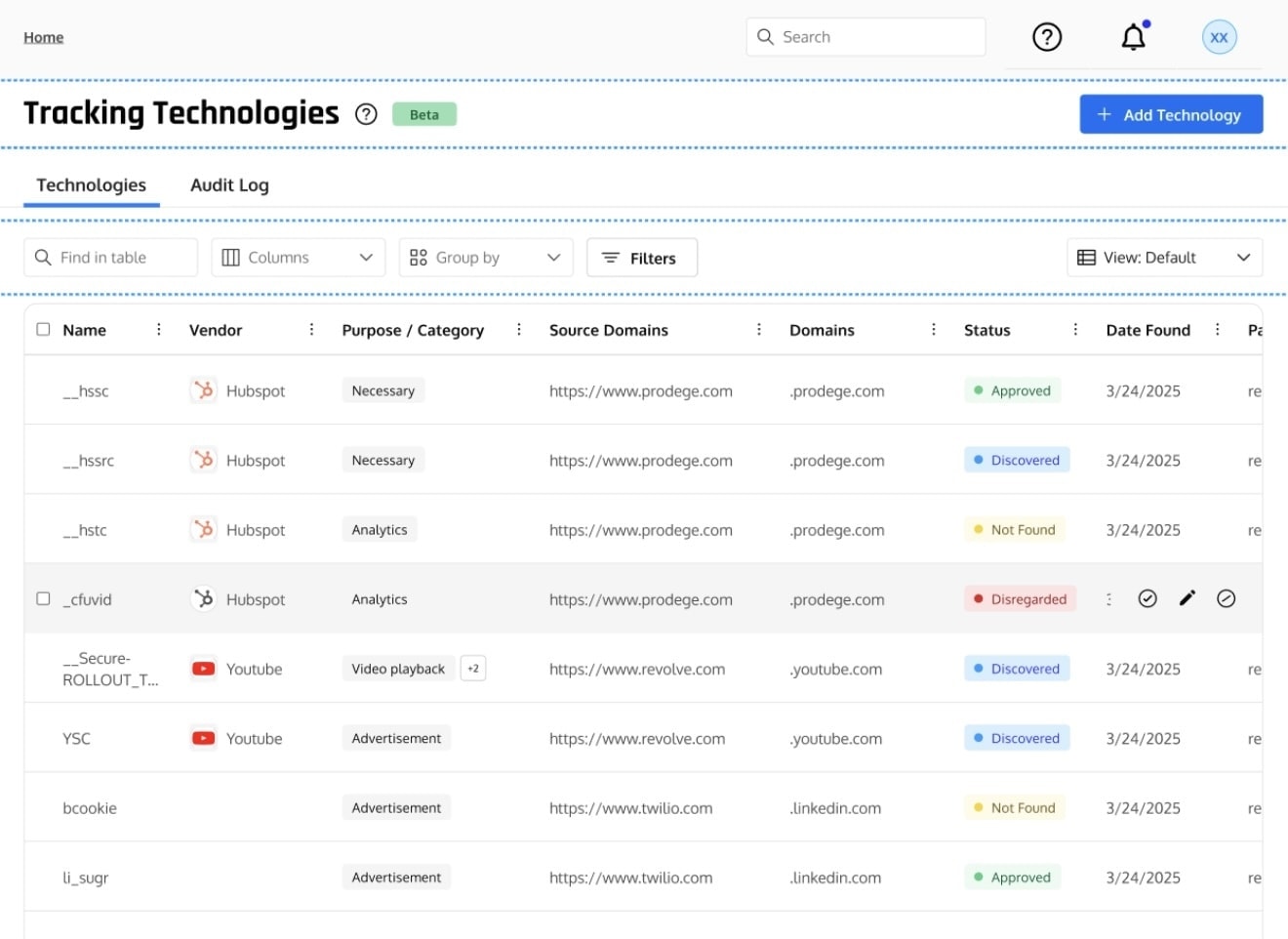We’re proud to introduce the first AI-native Consent Management platform, built by Relyance AI to meet the urgent demands of the modern digital landscape. With the explosion of tracking technologies and increasing regulatory pressure, businesses are struggling to keep up, especially as websites evolve into real-time, data-rich environments driven by AI. Traditional consent tools were never designed for this complexity. That’s why we reimagined consent from the ground up.
Our new Consent Management module is intelligent, adaptive, and proactive. It leverages powerful AI to automatically discover and classify all tracking technologies on your site, blocks unapproved trackers before they load, and continuously enforces consent across your data ecosystem. From legal to engineering to marketing, your teams finally have a purpose-built solution that simplifies consent, scales globally, and earns user trust at every click.

The Growing Challenge of Consent Management – A Recent Wake-Up Call from Regulators
A recent, notable example of this intensified scrutiny is the California Attorney General's landmark $1.55 million settlement with Healthline Media, announced just this month. The investigation revealed that Healthline failed to honor consumer opt-out requests, including Global Privacy Control (GPC) signals, and improperly shared personal information – particularly article titles that could infer sensitive medical conditions – with advertisers without proper contracts or sufficient consumer notice. This enforcement action highlights critical failures in identifying and controlling all trackers, ensuring opt-out mechanisms actually work, and protecting sensitive data inferences.
This isn't an isolated incident. The California Privacy Protection Agency (CPPA) has also been actively enforcing compliance, as seen in cases like the $345,178 settlement with fashion retailer Todd Snyder. Here, the issue was a misconfigured cookie consent banner that disappeared too quickly or simply didn't work, making it impossible for consumers to exercise their opt-out rights. Similarly, other retailers have faced scrutiny for opt-out links that only discussed cookie management but failed to stop the actual "sale" of personal information. These cases underscore a clear trend: regulators are technically testing cookie banners and opt-out mechanisms to ensure they deliver on their promises, rather than just existing as a legal formality.
For Privacy and Legal teams, this means creating and enforcing a compliant consent strategy and maintaining an auditable trail of consent for every user. For Engineering teams, this translates into the difficult technical task of identifying all trackers, implementing a consent banner, ensuring scripts are blocked correctly, and reliably capturing consent signals. This dual burden of legal, financial, and reputational risk, combined with technical complexity, makes effective consent management an imminent and desperate need. The Healthline and Todd Snyder settlements underscore that merely having a privacy policy or a cookie banner is not enough; the underlying mechanisms must truly function as promised to build and preserve foundational user trust.
Relyance AI's Solution: Seamless, Intelligent Consent Designed for Today's Demands
Relyance AI's Consent Management module directly solves these challenges and addresses the very issues highlighted in recent enforcement actions. The platform's Domain Analyzer automatically scans a customer's website to discover and classify active tracking technologies – leaving no hidden trackers, unlike what was observed with Healthline. Using the Interface Builder, customers can then deploy a brand-aligned, jurisdiction-aware consent banner that truly functions as intended. The Consent Agent not only manages user choices in real-time but also captures choices in the Consent Log, providing the auditable proof of consent that regulators now demand.
For proactive tracking technology control, the Consent Agent can also be configured to automatically block any new or unclassified tracking technologies until they are reviewed, ensuring no unapproved data collection occurs. This proactive blocking capability helps prevent the inadvertent sharing of data, including sensitive inferences.
"Trust is not simply the words you say, it is also the actions you take," says Abhi Sharma, Relyance CEO. "We saw how many businesses were struggling to align their stated privacy policies with their practices not out of malice, but out of complexity. No existing tool was powerful enough for legal teams to have adequate visibility and simple enough for engineering to implement. Our new Consent Management module directly addresses this need, filling a critical gap in our privacy suite and directly tackling the issues seen in recent major CCPA enforcements. It's a key step in our mission to provide a truly holistic data privacy platform and empower our customers to build trust through transparency."
How it Works: Getting Started with Ease
Getting started with Relyance AI Consent Management is straightforward. First, a customer adds their website domain. Our Domain Analyzer scans the site and uses its AI engine to classify the discovered trackers. The customer then uses the Interface Builder to design their consent interface and its rules, including the proactive tracking technology mode. After publishing, the platform provides the JavaScript for the Consent Agent. The engineering team adds this script to their website's header. The Consent Agent immediately begins serving consent experiences for regions across the globe, blocking trackers based on user preferences and proactive rules, and transmitting detailed records to the Consent Log for secure storage and monitoring.
Ready to Build Trust Through Transparency?
Begin building a better consent experience and ensure compliance today by visiting here.


